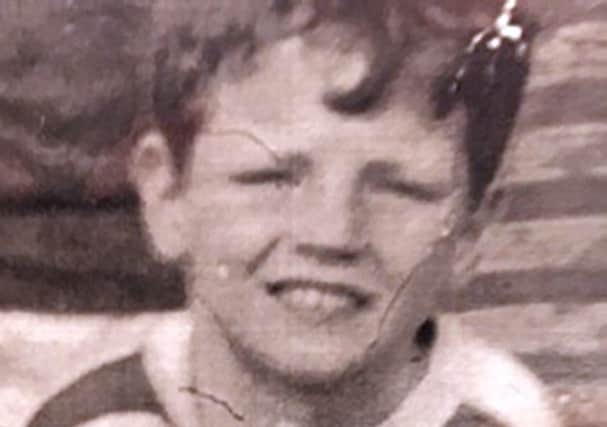Women and children not specifically targeted with rubber bullets: ex-major


But Major Trevor Veitch told a coroner’s court in Belfast it was not always possible to differentiate between an active rioter and a passing child.
He said: “If there was a crowd milling around there was no way we could distinguish at all.”
Advertisement
Hide AdAdvertisement
Hide AdThe retired Royal Anglian Regiment officer was giving evidence at the inquest of an 11-year-old schoolboy who died two days after being hit on the head by a rubber bullet in April 1972.
Francis Rowntree was struck while walking through the Divis Flats complex close to Belfast’s Falls Road in April 1972 – one of the worst years of the Troubles.
Controversy surrounds the shooting, with disputed claims on whether the boy was hit directly or injured by a ricochet, and if the bullet had been doctored to make it potentially cause more harm.
Although he said he remembers nothing about the incident involving Francis, Maj Veitch described a volatile and turbulent scene in a statement given to military police.
Advertisement
Hide AdAdvertisement
Hide AdHe had been in the front passenger seat of the armoured “Humber Pig” vehicle with six other soldiers tasked with providing cover for Royal Engineers who were removing a sand barricade blocking Divis Road.
He claimed at least 16 shots were fired at his men, adding that troops had come under sustained attack from a barrage of missiles including at least one blast bomb, petrol bombs and stones.
“I heard two baton rounds fired from behind me. (Soldier) B informed me that he had fired at the crowd and that he had hit someone,” he said in a statement.
Maj Veitch, who was in charge of 120 soldiers in the Divis area, rejected allegations that his regiment, which had links to the Parachute Regiment, was a “rough and bloodthirsty lot” feared by the local community.
Advertisement
Hide AdAdvertisement
Hide AdHe also denied claims his troops were angry at the loss of a colleague who had been shot dead days earlier.
The long-awaited inquest, which opened on Monday, was ordered by Attorney General John Larkin.
The court was also told that a military document dated November 1971 noted that not all weapons were acceptable for use on women and children.
Maj Veitch said: “Rioters were very young indeed. The night before, I had been ambushed in the middle of Divis by four girls.
Advertisement
Hide AdAdvertisement
Hide Ad“One would not disregard the fact they were women and children but dealt with the riot as it was occurring. If we could avoid women and children we did so.
“No children or women to my mind had been specifically aimed at or taken on in an aggressive manner but it must have happened because they were in a crowd.”
He said his troops tried to adhere to rules of engagement which advised minimum force be deployed to disperse crowds but admitted that warnings were not given before baton rounds were fired.
Locals were aware of the consequences of rioting, he said.
“I would talk to the people and warned them on a daily basis that young people would be hurt and perhaps killed if they took part in riots,” said Maj Veitch.
Advertisement
Hide AdAdvertisement
Hide Ad“I even called meetings of mothers – about 30 or 40 of them – and told them they are risking their children’s lives by allowing them to take part in these riots.
“Warnings were not practical. They knew what the military response was going to be.”
He had ordered baton rounds to be deployed to keep someone acting in an aggressive manner away from the military vehicle, adding he did not know they were potentially lethal.
Mr Veitch was unable to confirm whether they were justified in this particular case, the court heard.
Advertisement
Hide AdAdvertisement
Hide Ad“It was a weapon we were authorised to use and we did,” he said. “We had to disperse a crowd. We were under threat and therefore we fired this weapon.”
Maj Veitch gave evidence for several hours during an extended court session.
Earlier the court heard how military logs had been cut up.
Fiona Doherty, a barrister for the Rowntree family, said extracts from at least half a dozen pages were missing.
She said: “These are not redactions. They are cut out.
“These are from crucial periods of time. The pages go down right through the time period when the incident involving Francis Rowntree took place. I have never seen anything like it.”
Advertisement
Hide AdAdvertisement
Hide AdMartin Wolfe QC, representing the Ministry of Defence (MoD), said he would endeavour to obtain an explanation why the “historic” documents had been cut out.
Judge Brian Sherrard has asked the Ministry of Defence to make a statement.
The coroner said: “We may not be in a position to fill in the blanks but I would ask the MoD to provide somebody who could provide a statement concerning this.”
On Monday, a witness told the inquest the area had been quiet at the time when Francis was shot.
The schoolboy’s family believe the inquest is the last chance to establish the truth about what happened.
The hearing continues on Wednesday.